| Srl | Item |
| 1 |
ID:
168613
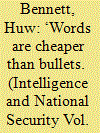

|
|
|
|
|
| Summary/Abstract |
Psychological warfare, the use of propaganda to aid military operations, acquired prominence in British strategy in the early Cold War Middle East. This article argues planning made limited progress until the 1956 Suez crisis. Suez produced optimism about propaganda’s ability to address threats from Egypt, the USSR and the Yemen. In Oman, Aden and Cyprus, psychological warfare was practiced to demoralise enemies, bolster allies and counter smears about British conduct. Only mixed results ensued though, and doubts about the military’s involvement in propaganda lingered. Psychological warfare endured because it was a cheap option that might sometimes work, and could induce opponents to surrender rather than fight on.
|
|
|
|
|
|
|
|
|
|
|
|
|
|
|
|
| 2 |
ID:
132235
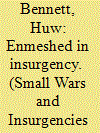

|
|
|
|
|
| Publication |
2014.
|
| Summary/Abstract |
Ten years of counterinsurgency in Iraq and Afghanistan have produced little in Britain's national interest. This article examines the political objectives set in these wars and the reasons why they have proved elusive. The core foreign policy aim was to sustain Britain's position as a great power by assuming responsibility for global order. Alliances with the United States and NATO would be the diplomatic tool for pursuing this aim. These alliances brought obligations, in the shape of agreed common threats. Rogue regimes with weapons of mass destruction and international terrorists harboured in failed states were deemed the primary threats to British security. Military means were therefore used in Iraq and Afghanistan to attack them. Whether Tony Blair's vision of global order ever made sense is debatable, and it attracted scepticism from the outset. The article argues experience in Iraq and Afghanistan showed that a strategy to eliminate terrorism (the WMD threat turned out never to have existed) by expeditionary counterinsurgency could only fail. Therefore the attention lavished on operational-level performance by most studies is misplaced, because no amount of warfighting excellence could make up for strategic incoherence. Finally, the article proposes the more important question arising from the last ten years is why the UK pursued a futile strategy for so long. The difficulties associated with interpreting events, a malfunctioning strategic apparatus, weak political oversight, and bureaucratic self-interest are posited as the most significant explanations.
|
|
|
|
|
|
|
|
|
|
|
|
|
|
|
|
| 3 |
ID:
096561
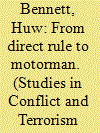

|
|
|
|
|
| Publication |
2010.
|
| Summary/Abstract |
The British campaign in Northern Ireland in the early 1970s is often portrayed as consistent in its repressive character and its failure to successfully relate military means to political ends. This article argues that British military strategy was adaptable, alternating between defensive and offensive means depending on the changing political context. The low profile policy allowed the army to consolidate a firm basis for later offensive operations against the Provisional Irish Republican Army (PIRA). This proved successful because it contrasted with Republican violence and was contextualized within the government's willingness to negotiate and compromise when necessary.
|
|
|
|
|
|
|
|
|
|
|
|
|
|
|
|
| 4 |
ID:
078706
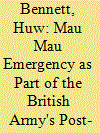

|
|
|
| 5 |
ID:
099857


|
|
|
|
|
| Publication |
2010.
|
| Summary/Abstract |
With strategic success in Iraq and Afghanistan far from certain, comforting beliefs about Britain's superiority at counterinsurgency have come under increasingly sceptical scrutiny. This article contributes to the debate with particular reference to the supposedly pivotal principle of minimum force. After discussing the recent literature on the subject, the article critiques the methodology employed by advocates of the traditionalist view on British COIN, arguing for a more rigorous historical approach based on primary sources. Following these historical matters, it is argued that conceptually, minimum force should be analysed dialectically in relation to practices of exemplary force, and above all, on the evidence of what happens in a conflict. Arguably the value ascribed to doctrine in strategic analysis has become unduly inflated, and we must look beyond it to understand war and political violence.
|
|
|
|
|
|
|
|
|
|
|
|
|
|
|
|
| 6 |
ID:
082140
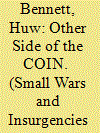

|
|
|